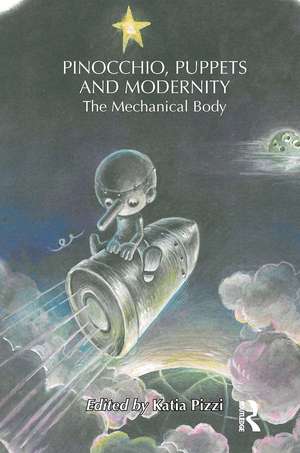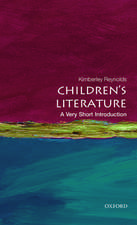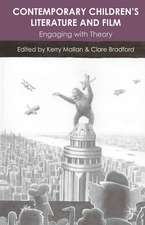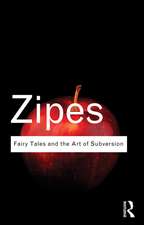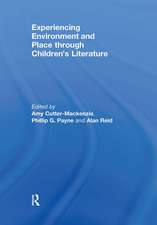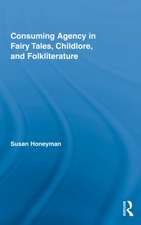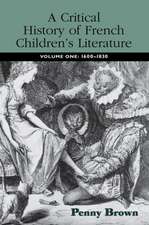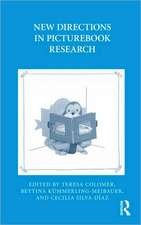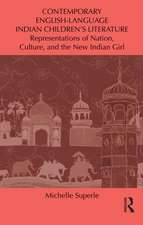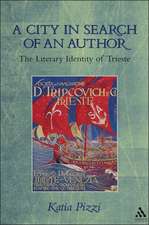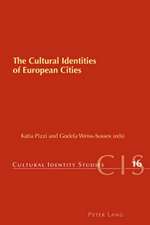Pinocchio, Puppets, and Modernity: The Mechanical Body: Children's Literature and Culture
Editat de Katia Pizzien Limba Engleză Paperback – 31 mai 2023
The wide-ranging scope of this exploration encompasses Italian, French, and English literature, dummies and marionettes in modernist and contemporary theatre, the fairytale tradition, and traditional and contemporary painting, as well as the older and newer media of radio, television, cinema, and the Internet. The diverse, comparative, and multimedia focus of this original discussion testifies to the enduring transcultural legacy of Pinocchio. Eminently sellable as a traditional cultural icon, Pinocchio is equally impactful and relevant for a globalized, multicultural, and virtual society, from Collodi to Disney and beyond.
Katia Pizzi is Senior Lecturer in Italian at the Institute of Germanic & Romance Studies, School of Advanced Study, University of London. She has published volumes on cultural identities, including A City in Search of an Author (2001) and The Cultural Identities of European Cities (2010), and on children's literature and illustration.
| Toate formatele și edițiile | Preț | Express |
|---|---|---|
| Paperback (1) | 259.98 lei 6-8 săpt. | |
| Taylor & Francis – 31 mai 2023 | 259.98 lei 6-8 săpt. | |
| Hardback (1) | 1060.52 lei 6-8 săpt. | |
| Taylor & Francis – 25 oct 2011 | 1060.52 lei 6-8 săpt. |
Din seria Children's Literature and Culture
- 8%
 Preț: 395.78 lei
Preț: 395.78 lei -
 Preț: 340.86 lei
Preț: 340.86 lei -
 Preț: 372.91 lei
Preț: 372.91 lei -
 Preț: 384.78 lei
Preț: 384.78 lei -
 Preț: 325.43 lei
Preț: 325.43 lei - 9%
 Preț: 1005.33 lei
Preț: 1005.33 lei -
 Preț: 369.45 lei
Preț: 369.45 lei - 8%
 Preț: 464.67 lei
Preț: 464.67 lei - 9%
 Preț: 1004.19 lei
Preț: 1004.19 lei -
 Preț: 370.28 lei
Preț: 370.28 lei - 28%
 Preț: 877.59 lei
Preț: 877.59 lei - 18%
 Preț: 1113.25 lei
Preț: 1113.25 lei -
 Preț: 432.87 lei
Preț: 432.87 lei - 18%
 Preț: 1007.82 lei
Preț: 1007.82 lei - 15%
 Preț: 461.65 lei
Preț: 461.65 lei - 18%
 Preț: 942.82 lei
Preț: 942.82 lei - 18%
 Preț: 1058.43 lei
Preț: 1058.43 lei - 18%
 Preț: 1106.05 lei
Preț: 1106.05 lei - 18%
 Preț: 1117.77 lei
Preț: 1117.77 lei - 18%
 Preț: 1117.07 lei
Preț: 1117.07 lei - 18%
 Preț: 1057.26 lei
Preț: 1057.26 lei - 28%
 Preț: 824.70 lei
Preț: 824.70 lei - 34%
 Preț: 409.04 lei
Preț: 409.04 lei - 18%
 Preț: 1055.66 lei
Preț: 1055.66 lei - 18%
 Preț: 1058.43 lei
Preț: 1058.43 lei - 18%
 Preț: 1114.30 lei
Preț: 1114.30 lei - 18%
 Preț: 1109.04 lei
Preț: 1109.04 lei - 18%
 Preț: 1111.87 lei
Preț: 1111.87 lei -
 Preț: 491.68 lei
Preț: 491.68 lei - 18%
 Preț: 1061.22 lei
Preț: 1061.22 lei - 18%
 Preț: 1058.79 lei
Preț: 1058.79 lei - 18%
 Preț: 1112.83 lei
Preț: 1112.83 lei - 18%
 Preț: 1057.40 lei
Preț: 1057.40 lei - 18%
 Preț: 1055.51 lei
Preț: 1055.51 lei - 18%
 Preț: 1055.51 lei
Preț: 1055.51 lei - 34%
 Preț: 352.20 lei
Preț: 352.20 lei -
 Preț: 482.74 lei
Preț: 482.74 lei - 18%
 Preț: 1058.43 lei
Preț: 1058.43 lei - 15%
 Preț: 544.28 lei
Preț: 544.28 lei - 18%
 Preț: 1059.14 lei
Preț: 1059.14 lei - 28%
 Preț: 822.36 lei
Preț: 822.36 lei - 18%
 Preț: 1109.66 lei
Preț: 1109.66 lei - 18%
 Preț: 1054.75 lei
Preț: 1054.75 lei - 25%
 Preț: 771.71 lei
Preț: 771.71 lei - 18%
 Preț: 1066.72 lei
Preț: 1066.72 lei - 18%
 Preț: 1006.43 lei
Preț: 1006.43 lei
Preț: 259.98 lei
Preț vechi: 334.03 lei
-22% Nou
Puncte Express: 390
Preț estimativ în valută:
49.75€ • 54.02$ • 41.79£
49.75€ • 54.02$ • 41.79£
Carte tipărită la comandă
Livrare economică 22 aprilie-06 mai
Preluare comenzi: 021 569.72.76
Specificații
ISBN-13: 9781032569673
ISBN-10: 1032569670
Pagini: 246
Dimensiuni: 152 x 229 mm
Greutate: 0.45 kg
Ediția:1
Editura: Taylor & Francis
Colecția Routledge
Seria Children's Literature and Culture
Locul publicării:Oxford, United Kingdom
ISBN-10: 1032569670
Pagini: 246
Dimensiuni: 152 x 229 mm
Greutate: 0.45 kg
Ediția:1
Editura: Taylor & Francis
Colecția Routledge
Seria Children's Literature and Culture
Locul publicării:Oxford, United Kingdom
Public țintă
Postgraduate and UndergraduateCuprins
Introduction. Katia Pizzi 1. Carlo Collodi and the Rhythmical Body. Between Giuseppe Mazzini and George Sand. Jean Perrot 2. Puppets on a String: The Unnatural History of Human Reproduction. Ann Lawson Lucas 3. Workshops of Creation, Filthy and Not: Collodi’s Pinocchio and Shelley’s Frankenstein. Charles Klopp 4. The Manufacture of a Modern Puppet Type: The Anatomy of Alfred Jarry’s Monsieur Ubu and its Significance. Jill Fell 5. Man is Non-Man: Mannequins, Puppets and Marionettes in the Theatre of Dario Fo. Christopher Cairns 6. Unpainting Collodi’s Fireplace (with an interview with the author). Stephen Wilson 7. Pinocchio and the Mechanical Body: Luciano Folgore’s Papers at the Getty Research Institute Library. Katia Pizzi 8. The Myth of Pinocchio. Metamorphosis of a Puppet from Collodi’s Pages to the Screen. Salvatore Consolo 9. The Watchful Mirror: Pinocchio’s Adventures Re-created by Roberto Benigni. Salvatore Consolo 10. Beyond the Mechanical Body: Digital Pinocchio. Massimo Riva
Descriere
Descriere de la o altă ediție sau format:
The concept of this book is to reassess Pinocchio originally, alongside puppets and marionnettes within modernity, as a figure characterized by a ‘fluid identity’, informed with transition, difference, joie de vivre, otherness, displacement and metamorphosis. As such, Pinocchio is a truly modern, indeed a postmodern and posthuman cultural icon.
The concept of this book is to reassess Pinocchio originally, alongside puppets and marionnettes within modernity, as a figure characterized by a ‘fluid identity’, informed with transition, difference, joie de vivre, otherness, displacement and metamorphosis. As such, Pinocchio is a truly modern, indeed a postmodern and posthuman cultural icon.
